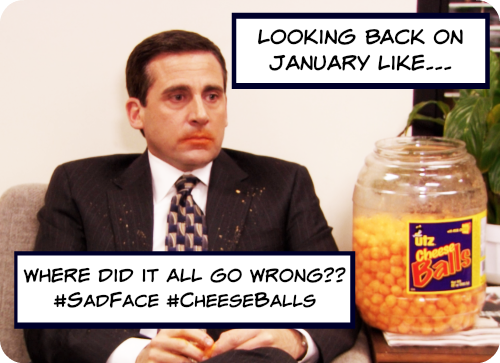Need a search and rescue mission to find your New Year’s motivation?

Don’t feel bad! If your New Year’s resolutions have totally fizzled out, you’re not alone. According to a 2002 study, roughly 30% of all resolvers drop off after 1-2 weeks!

Fortunately, research offers plenty of inspiration for getting back on track!

According to the same study, 46% of people who make New Year’s resolutions are continuously successful at the six month mark – compared to only 4% of non-resolvers (i.e., people who identify a behavior they want to change, but don’t commit to any active plan).
That’s why today’s post is all about rescuing our resolutions before it’s too late!

For evidence-based inspiration, check out the tips and tricks below!
Set goals that make you happy

According to a 2007 study that compared flourishing and languishing (basically: being genuinely happy versus just getting by), completely mentally healthy/flourishing adults had the lowest number of chronic physical conditions at all ages! And get this: The youngest adults who were languishing had the same number of chronic physical conditions as older adults who were flourishing!
Pretty strong case for setting goals that make you happy, right? Research has also suggested that happiness increases longevity! (For more details, check out Positive Psychology: The Science of Beyonce!)
So before you commit to running a marathon, pursuing a promotion, or going back to school: Write down what makes you happy. Then base your goals off of that!
Plan smart

After you’ve figured out what brings you happiness, use this personal training trick (recommended by the National Academy of Sports Medicine) to design a plan that will really work. Make sure your goals are SMART:
SPECIFIC: Get as detailed as possible! Want to stay more organized? What does that mean: receipts always go in a folder, laundry gets sorted by color? Write down exactly what you want to accomplish.
MEASURABLE: Decide on a method to assess your progress. Want to get in shape? What will you use to track your journey: a measuring tape, scale, body fat calipers? Pick a method and stay consistent!
ATTAINABLE: Choose goals that are challenging, but not too extreme. Never ran before? Make your first goal a 5K, not a marathon. You can always set a new goal later!
REALISTIC: Pick a plan that you’re willing and able to work towards. Want to be a professional surfer? Either move close to a beach or pick a different goal! :)
TIMELY: Set a specific date of completion. Trying to finish your novel? Set a deadline and get to writing!
Tackle your resolutions head on

Need some extra inspiration? Research has shown that optimism and pro-active coping (i.e., not avoiding things) are linked to positive health benefits! For instance, a 1996 study of cardiac rehab patients found that optimism was related to success in lowering levels of saturated fat, reducing body fat, and positively influencing an index of overall coronary risk! (To learn more, check out: How to be Optimistic Like a Boss!)
Use the right fuel

What you eat has a huge effect on how you think and feel. For instance, a study of 2,222 elementary students found that children with high intakes of sweets and fried foods were 1.5 times more likely to have unfavorable overall school performance. Likewise, a study that compared obese children with children who had normal height/weight ratios found that healthier children had significantly better IQ performance than those in the severely obese group.
High-calorie foods have also been shown to impair working memory performance. (The eight states that make up America’s “Stroke Belt” have higher incidences of obesity and a greater chance of dementia!) Researchers have also noted that highly processed foods may share pharmacokinetic properties with drugs! (For more stats, check out: Nutrition and Academic Achievement, Food’s Effect on Memory, and Addictive Properties of Highly Processed Foods.)
So make sure you set aside time to meal prep and eat healthy – it’s a small investment that will greatly benefit each and every one of your goals!
Get moving

No matter what your resolutions are, exercise is guaranteed to help! Working out increases energy, improves mood, and has a positive impact on mortality! Just take a look at some of this research:
The ability of exercise to improve mood and reduce anxiety has been well-established. However, recent research has suggested that exercise may also promote a resiliency to emotional stressors after your workout is complete! Scientists have also found that adults who walked for 40 minutes three times a week for a year had brain growth in the hippocampus – an area of the brain associated with spatial memory!
Perhaps most impressive: It’s been estimated that people who are physically active for approximately seven hours a week have a 40% lower risk of dying early than those who are active for less than 30 minutes a week! And, of course, who can forget my favorite exercise study of all time:
In 1999, researchers assigned 156 depressed participants to an exercise, antidepressant, or exercise and antidepressant group. Those in the exercise group walked or jogged on a treadmill for 30 minutes three times per week for 16 weeks. Those in the antidepressant group received Zoloft. Those in the combination group received both antidepressants and exercise.
Results showed that while medication worked more quickly to reduce symptoms of depression, there were no significant differences among treatment groups at 16 weeks. And get this: A 10-month follow-up revealed that exercise-only group members had significantly lower rates of depression than those in the antidepressant or combination groups!
Pray or meditate

Speaking of promoting positive mental health, a review of 444 quantitative research studies found that religious/spiritual involvement lessened the incidence of depression and/or reduced depression severity in over 60% of the studies! Meditation is also known to have some pretty powerful effects on the mind. One study found that meditating for just 30 minutes a day for eight weeks produced measurable changes in gray matter density in parts of the brain associated with memory, sense of self, empathy and stress!
When you’re trying to accomplish a new goal, it’s important to adopt the right mind frame and stay focused. Praying and/or meditating can help you stay in the zone by reducing stress and even improving your physical health! (For more on faith and healing, check out this article I wrote for MindBodyGreen: Can Saying a Prayer Really Heal You?.)
New Year’s resolutions recap

Hopefully these tips helped! Remember: Don’t get discouraged and don’t give up! Focus on goals that make you happy, plan strategically, confront obstacles, eat healthy, exercise, and say your prayers!

And remember: Circumstances only dictate 10% of our happiness! You control a lot more than you think! :)
Subscribe for blog updates
I don’t really have a consistent blogging schedule (maybe that should be one of my resolutions!), so if you’d like to get a quick email whenever I do post, please feel free to enter your email below!
Please note: In order to activate your subscription, you have to open the first email and click confirm ♥
You can also find Prayers and Apples on Facebook, Twitter, and Pinterest. And if you enjoyed today’s post and would like to share (yay! thank you!!), the lil social media share buttons are wayyy down at the bottom after the references :)

Thanks for reading!
References
Blumenthal, J.A., Babyak, M.A., Moore, K.A, Craighead, W.E., Herman, S., Khatri, P., Napolitano, M.A., Forman, L.M., Applebaum, M., Doraiswamy, P.M. & Krishnan, P.R. (1999). Effects of exercise training on older patients with major depression. Archives of Internal Medicine, 159(19), 2349-2356.
Bonelli, R., Dew, R.E., Koenig, H.G., Rosmarin, D.H. & Vasegh, S. (2012). Religious and spiritual factors in depression: review and integration of the research. Depression Research and Treatment, 2012.
Cheng, L., Fu, M-L., Pan, W-H. & Tu, S-H. (2007). Association between unhealthful eating patterns and unfavorable overall school performance in children. Journal of the American Dietetic Association, 107: 1935-1943.
Dusek, J.A., Otu, H.H., Wohlhueter, A.L., Bhasin, M., Zerbini, L.F., Joseph, M.G., Benson, H. & Libermann, T.A. (2008). Genomic counter-stress changes induced by the relaxation response. PLoS One, 3(7): e2576.
Erickson, K.I., Voss, M.W., Prakash, R.S., Basak, C., Szabo, A.,… Kramer, A.F. (2011). Exercise training increases size of hippocampus and improves memory. Proceedings of the National Academy of the Sciences, 108(7): 3017-3022.
Holzel, B.K., Carmody, J., Vangel, M., Congleton, C., Yerramsetti, S.M., Gard, T. & Lazar, S.W. (2011). Mindfulness practice leads to increases in regional brain gray matter density. Psychiatry Research: Neuroimaging, 191(1): 36-43.
Keyes, C.L.M. (2007). Promoting and protecting mental health as flourishing: A complementary strategy for improving national mental health. American Psychologist, 62: 195-108.
Li, X. (1995). A study of intelligence and personality in children with simple obesity. International Journal of Obesity and Related Metabolic Disorders, 19(5): 355-357.
Lyubomirsky, S., Sheldon, K.M. & Schkade, D. (2005). Pursuing happiness: The architecture of sustainable change. Review of General Psychology, 9(2): 111-131.
Meule, A., Skirde, A.K., Freund, R., Vögele, C. & Kübler, A. (2012). High-calorie food-cues impair working memory performance in high and low food cravers. Appetite, 5 (2): 264-269.
National Academy of Sports Medicine. (2011). NASM Essentials of Personal Fitness Training.
Norcross, J., Mrykalo, M.S. & Blagys, M.D. (2002). Auld lang syne: Success predictors, change processes, and self-reported outcomes of New Year’s resolvers and nonresolvers. Journal of Clinical Psychology, 58(4): 397-405.
Schou, I., Ekeberg, Ø. & Ruland, C.M. (2005). The mediating role of appraisal and coping in the relationship between optimism-pessimism and quality of life. Psychooncology, 14(9): 718-27.
Schulte, A.M., Avena, N.M. & Gearhardt, A.N. (2015). Which foods may be addictive? The roles of processing, fat content, and glycemic load. PLoS ONE, 10(2): e0117959.
Shepperd, J.A., Maroto, J.J. & Pbert, L.A. (1996). Dispositional optimism as a predictor of health changes among cardiac patients. Journal of Research in Personality, 30(4): 517-534.
Smith, J.C. (2013). Effects of emotional exposure on state anxiety after acute exercise. Medicine and Science in Sports and Exercise, 45(2): 372-378.
U.S. Department of Health and Human Services. (2008). 2008 Physical Activity Guidelines for Americans.
Veenhoven, R. (2008). Healthy happiness: Effects of happiness on physical health and the consequences for preventative health care. Journal of Happiness Studies, 9(3): 449-469.


Leave a Reply